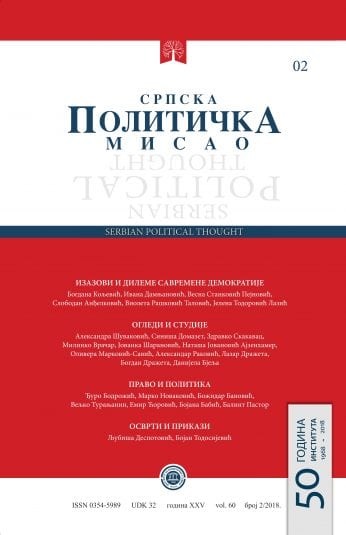Августовa реформа брака и породице
Marriage and Family Reform by Augustus
Author(s): Emilija Stanković, Srđan C. VladetićSubject(s): Social history, Ancient World
Published by: Институт за политичке студије
Keywords: Augustus; natality; family; marriage
Summary/Abstract: Aware that the past events, from a century before his successtion to the throne, ruined his marriage, posterity and family life, with the adoption of lex Iulia de maritandis ordinibus, lex Papia Poppea и lex Iulia de adulteriis coercendis Augustus tried to preserve old family morality and marriage, as well as to increase the birth rate, particularly among higher classes of population. This law prescribes the age for enetering into marriage, privileges for the individual who respect it, but also the penalties for those who don’t in terms of loosing the right to inheritance and legates in general. In order to secure the efficiency of its implementation Augustus appointed the informants paying them to follow people and check whether they comply with the provisions of this law. Due to immorality and lack of dignity that is connected to certain professions and in order to preserve the distinction between certain classes, Roman senators were forbidden to marry a prostitute, an actress or a libertiones legeret woman. Through ius liberorum (the privilege through children) and ius trium liberorum (the privilege of three children) the individuals having children could avoid being punished for the offences for which childless people had to bear consequences. Other privileges were prescribed for the families with three children, as well. In order to raise family morality, adultery was stricktly punished and for that purpose a standing court was established to publicly try such cases (quaestio perpetua de adulteriis). Incest and all kinds of sex crimes (stuprum) were also strictly punished. Although these laws were comprehensive and strict, they did not prove to be efficient as a means of Augustus’ ethical reform. Birth rate was not increased, while the number of bachelors, spinsters, divorce cases and sex crimes had grown as well. The reasons for failure can be found in the objectives of this law, which were set high at the very beginning. Also, the private life of people and their moral values could not be regulated by law exclusively. This is the reason why there were so many attempts to circumvent this law. Thus, the punishments for not being married or having children were avoided fideicommissum with prolonged engagements, adoptions, registration of prostitutes, etc., while in time the informants had usurped so much of property that be came the threat for all classes of population. Moreover, Augustas was moving covertly but quickly from a republic to an empire which is by nature of a universal and not of a national character. In such a mixture of nations, religions and customs, it was impossible to restore old Republican morality which this law supported.
Journal: Српска политичка мисао
- Issue Year: 2018
- Issue No: 4
- Page Range: 353-369
- Page Count: 17
- Language: Serbian

